Friends of AHBIC
If you aren’t already a Friend of AHBIC, we welcome you to join our group of organisations and individuals who are supporting Australia’s national beekeeping industry that supports you.


If you aren’t already a Friend of AHBIC, we welcome you to join our group of organisations and individuals who are supporting Australia’s national beekeeping industry that supports you.

I welcome MJ Mortes to the AHBIC team. MJ is the Project support officer as part of Transition to Management. MJ has hit the ground running and is already adding value. Welcome MJ.
AHBIC, along with many other industry representatives, attended a successful Honey Marketing workshop at Sydney University. The funding for this came from the NSW Bushfire Industry Recovery Package grant monies. There had been an underspend due to COVID and permission was received to run a marketing workshop. The workshop was led by two marketing experts from Sydney University and University of Technology Sydney.
Hopefully the result will be a National Australian Honey Marketing strategy/plan for industry to consider. As money becomes available, we can implement parts of the plan giving a clear and consistent message about the benefits of Australian honey.
AHBIC chaired the National Biosecurity and Surveillance Steering Committee (NBSSC) meeting. Long term funding for our BBO’s and surveillance hives is an ongoing issue.
The Education, Imported Honey, Levies, AHBIC events sub committees all have met and are moving forward. AHBIC thanks all the volunteers on our sub committees who add valuable input to AHBIC and the industry.
The next steps in planning for The 5th Australian Bee Congress are to decide on a theme and then approaching appropriate guest speakers to make the event a success in Adelaide 2026.
Stephen Targett
Chair

November has been a busy month for the team with work continuing on the T2M, imported honey, National surveillance program and varroa treatment options consuming much of our time. In this update I talk about the new permit for ApiBioxal, the separation of the existing permits and the consultation for the Code of Practice (CoP) and Emergency Plant Pest Response (EPPR) fund.
ApiBioxal Permit Approval
The APVMA has approved a use permit for ApiBioxal, for two application methods; dribbling and vaporisation (fogging). This is the culmination of a significant piece of work lead by the NSW DPIRD and continually pushed by AHBIC. The permit approval process has taken 10 months since the permit application was submitted with the application work initiated mid-2023. This demonstrates the long timeframes for applications at APVMA in getting new chemical treatment options available for industries use.
The new permit allows beekeepers, in states that have approval (currently NSW and Vic), to treat their hives only with ApiBioxal. The permit is not a generic blanket approval for the use of any Oxalic acid product, it is specifically the ApiBioxal product.
The permit is held by NSW DPIRD but this allows for any retailer to sell the product to the public (except retailers in Tasmania) subject to local state legislation. Sales can only be made to beekeepers in states approved for use. For example: a South Australian supply store can sell to Vic or NSW beekeepers for use but not to a South Australian beekeeper. There is no single approved suppler list associated with this permit as was the process for other previous permits.
Transition from emergency use permits to minor use permits
The APVMA and NSW DPIRD have also split the grouped emergency use permits into a single minor use permit per product. As products achieve full registration and Australian labelled products begin to hit the market, the separation of the permits will allow for easier cancellation of the minor use permits in due course. This is an administrative change and will not affect the use, except that supply business are no longer listed within the permit document. This means that any supply business can now sell treatments but only to those beekeepers in states allowed to use them.
Beekeeping Code of Practice Revision
As part of the transition to management program we are updating the beekeeping industry Code of Practice (CoP). This process has been widely consulted with industry and governments and their input has been collated into a final draft document. Whilst most of the changes are minor it is proposed to lower the hive threshold, to which part C applies, from 50 or more to 5 hives or more. This proposed change will create a lot of discussion, and we are again consulting widely with industry and government before finalising the document.
Emergency Plant Pest Response Fund
Hopefully many have seen the letters, presentations and social media posts further communicating the proposed increase to the EPPR levy to repay the varroa response. The formal objection period is now open until the 18th December. Click here to read about the proposed changes and how to lodge an objection.
The Month Ahead
As we roll into Christmas we will continue to work on the industry issues at hand but we note government shutdowns over Christmas may slow some of our progress. The last weeks of November we have an AHBIC member bodies meeting followed by an AHBIC board meeting and the Plant Health Australia AGM at the end of the month before wrapping up another big year for AHBIC.
Danny LeFeuvre
CEO
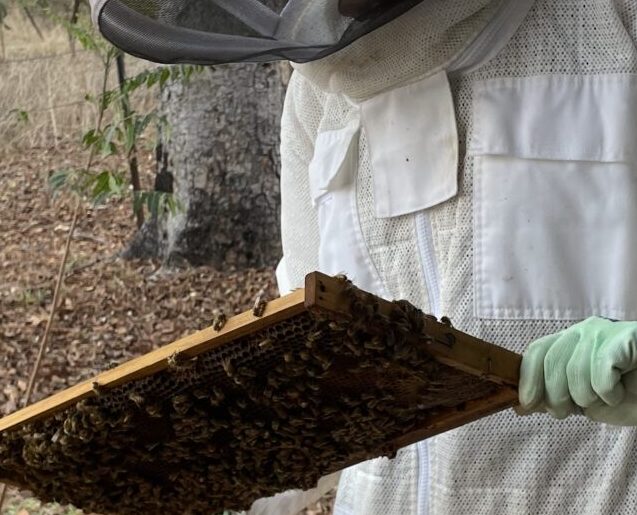
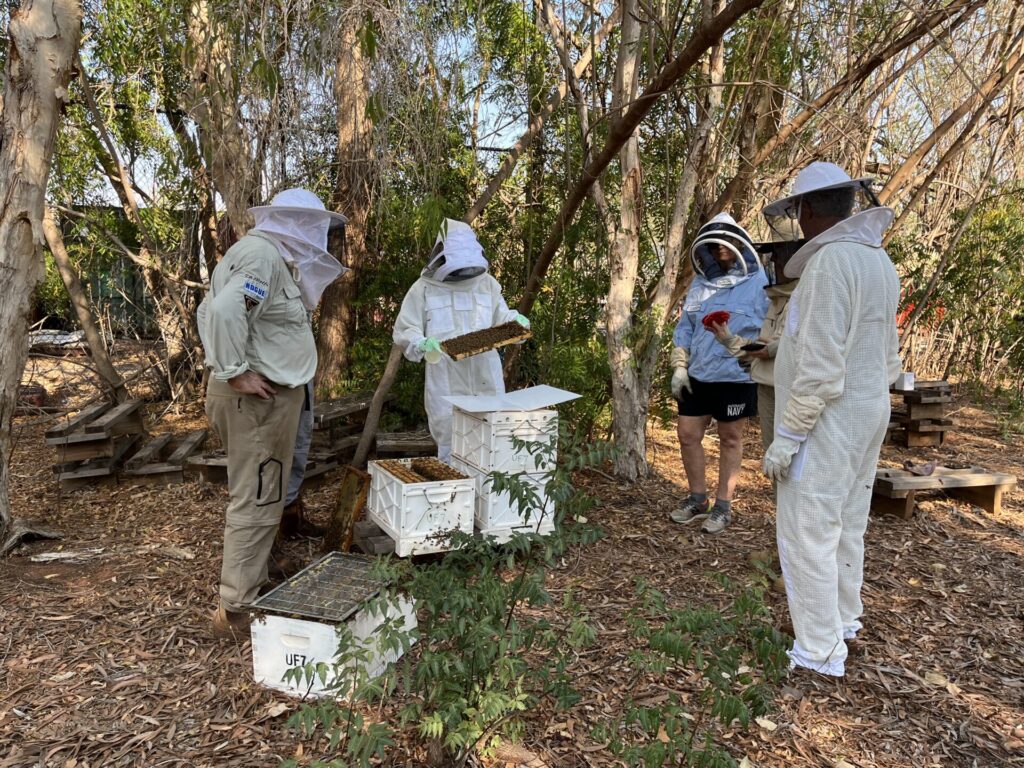
In October 2024, NT VDO Karlee Foster travelled to Broome, Derby and Kununurra offering hive demonstrations to local hobbyist and commercial beekeepers focusing on varroa mite monitoring in addition to social opportunities in each location. Karlee was accompanied by two WA DPIRD staff, Kate Powell and Jessica Bikaun, in Broome and Derby.
The local knowledge and existing beekeeper relationships provided by DPIRD staff were integral to the positive outcomes of the trip and a springboard for future positive engagements.
Generally the beekeepers that participated all had a desire to have bees for honey production, some commercially and of the commercial beekeepers, some pollination services were a regular diversification for their ongoing business. Learning more about he varroa mite and its impacts to their beekeeping practice, was a valuable experience.
Hive demonstrations!
VDO Karlee, WADPIRD Apiary team Kate and Jessica provided practical hands-on demonstrations in the apiaries identifying suitable brood frames to conduct the alcohol wash as the preferred detection method. Explanatory discussions of monitoring, mechanical and chemical treatments and varroa anatomy and biology occurred both before and after hive demonstrations in each location. Each discussion varied somewhat in content and was tailored to the attendee’s knowledge and interest.
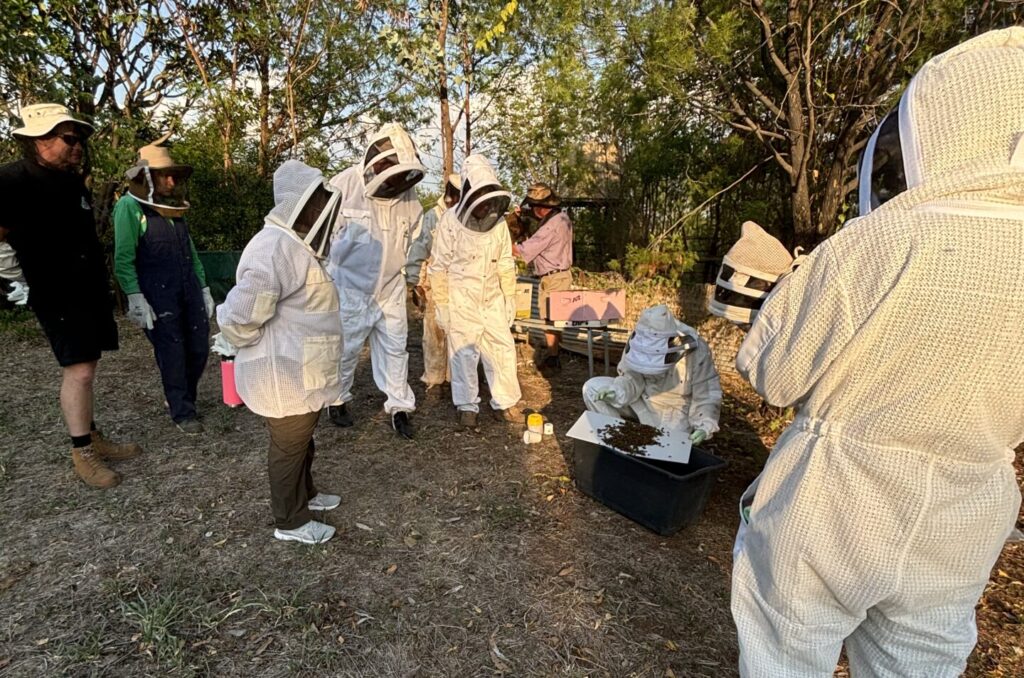
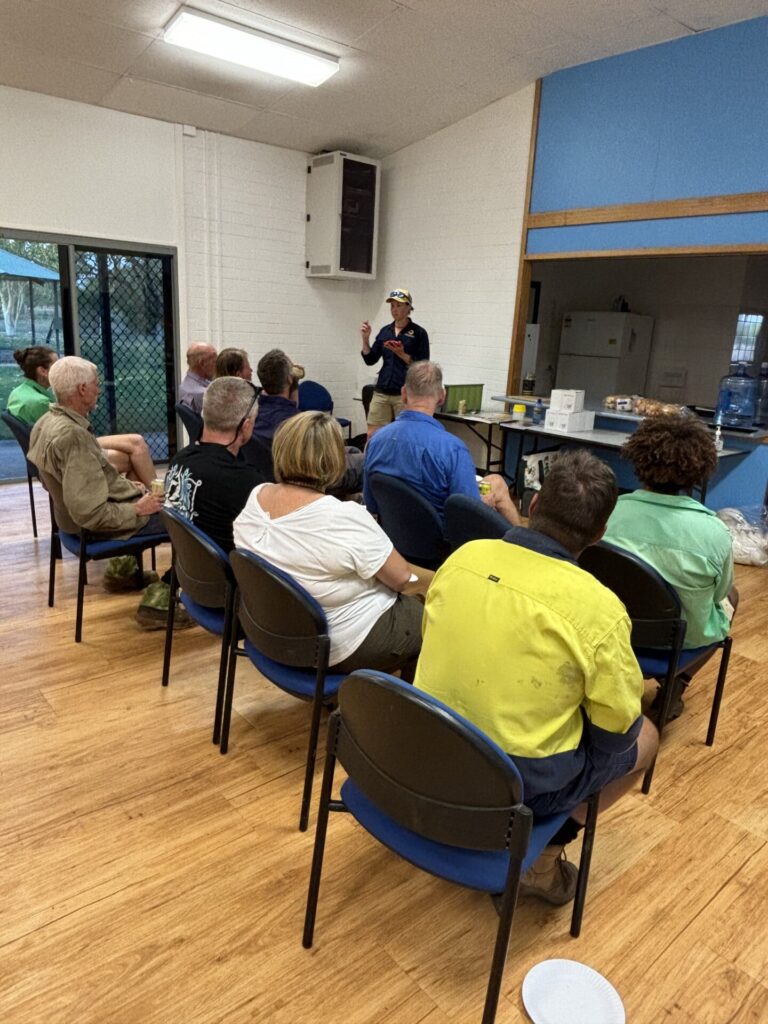
Across the country, Varroa Development Officers are employed under the T2M in all states and territories. They are here for a limited time, some wrapping up as soon as March 2025, and all activities wrapping up at the same time as the T2M in February 2026.
Reach out to a VDO in your local state or territory to find out more on how a VDO can help to provide hands on beekeeping skills for varroa management and learning for the future, their time employed is limited so AHBIC encourages beekeepers, clubs and associations to reach out and ask about a valuable VDO engagement opportunity near you! varroa.org.au
Article adapted from Report written by Karlee Foster NT VDO, thanks Karlee.
AgriFutures Australia is committed to fostering innovation in agriculture by helping our levy payers and the broader agricultural workforce by investing in leadership, capacity, skills development programs, and Australian agricultural scholarships.

AHBIC encourages leaders from our Member bodies and those willing to upskill across a number of leadership and governance programs to read further.
Opportunities such as:
![]()
Click Here to go to the Webpage!
Sheridan Ingold
Manager, Capacity Building
Email: sheridan.ingold@agrifutures.com.au
Phone: 0438 921 421
Emily Jones
Coordinator, Capacity Building and evokeAG
Email: emily.jones@agrifutures.com.au
Phone: 0455 980 310

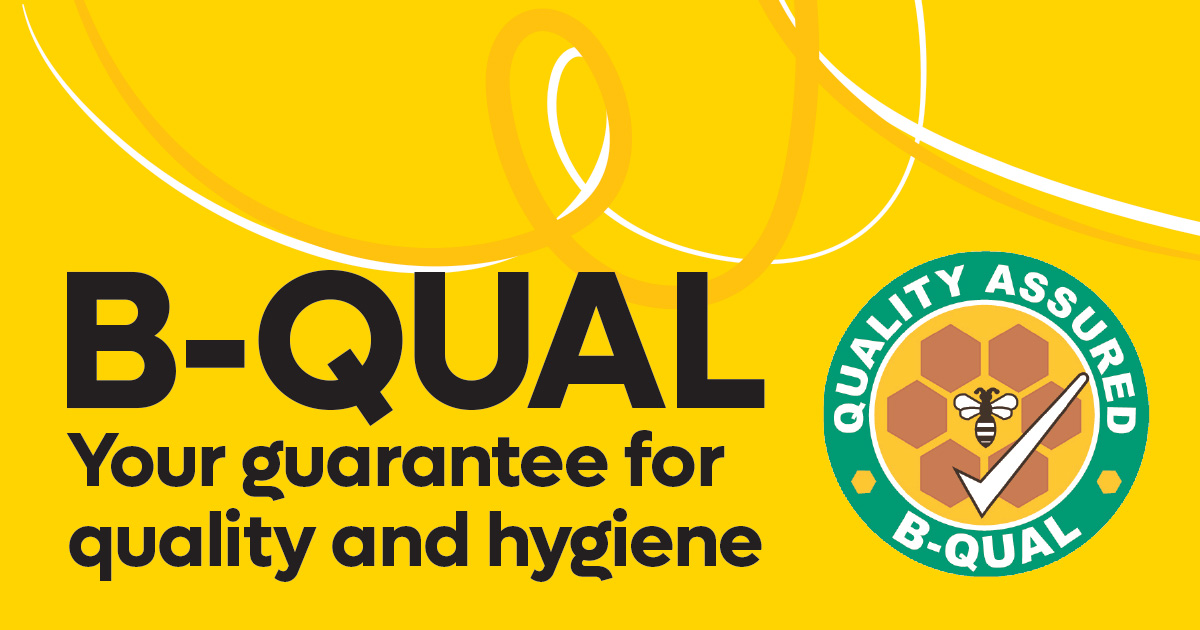
B-QUAL is an Industry Owned Quality Assurance System for Australian beekeepers.
How does B-QUAL certification benefit my business?
B-QUAL Certification also enables an enterprise to market its product under the B-QUAL logo to show that it meets the B-QUAL Industry Standards.
Complete your training at home at your own pace.
For more information and to obtain a Certification Information Pack, contact the B-QUAL Certification team.
www.bqual.com.au
B-QUAL Pty Ltd
Phone 07 49949820
Email: admin@bqual.com.au